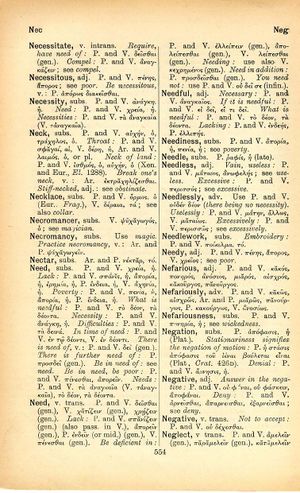negative: Difference between revisions
From LSJ
τῶν λεγομένων τά μέν κατά συμπλοκήν λέγεται, τά δέ ἄνευ συμπλοκῆς → forms of speech are either simple or composite (Aristotle, Categoriae 1a16-17)
(Gf-D_6) |
(3_9) |
||
| Line 9: | Line 9: | ||
{{Gaffiot | {{Gaffiot | ||
|gf=<b>nĕgātīvē</b>, ([[negativus]]) négativement : Cassiod. Lib. litt. De rhet. arg. 3 ; Boet. Top. Cic. 5. | |gf=<b>nĕgātīvē</b>, ([[negativus]]) négativement : Cassiod. Lib. litt. De rhet. arg. 3 ; Boet. Top. Cic. 5. | ||
}} | |||
{{Georges | |||
|georg=negātīvē, Adv. ([[negativus]]), [[verneinend]] (Ggstz. [[affirmative]]), Cassiod. de dialect. p. 548 (a) ed. Garet. Boëth. in Cic. top. lib. 5. p. 359, 9 B. | |||
}} | }} | ||
Revision as of 09:30, 15 August 2017
English > Greek (Woodhouse)
adj.
Answer in the negative: P. and V. οὐ φάναι, οὐ φάσκειν, ἀποφάναι. Deny: P. and V. ἀρνεῖσθαι, ἀπαρνεῖσθαι, ἐξαρνεῖσθαι; see deny. v. trans. Not to accept: P. and V. οὐ δέχεσθαι.
Latin > French (Gaffiot 2016)
nĕgātīvē, (negativus) négativement : Cassiod. Lib. litt. De rhet. arg. 3 ; Boet. Top. Cic. 5.
Latin > German (Georges)
negātīvē, Adv. (negativus), verneinend (Ggstz. affirmative), Cassiod. de dialect. p. 548 (a) ed. Garet. Boëth. in Cic. top. lib. 5. p. 359, 9 B.

